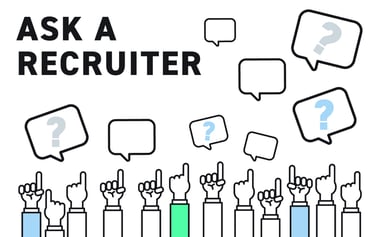Welcome to our Ask a Recruiter Series, where our Creative Talent Representatives answer your burning questions related to job hunting, resume submission, portfolios, and more.
This month, meet Ellen Reda, our Director of Operations and one of our former fabulous Recruiters in Chicago. She's a pro when it comes to job hunting across verticals, finding your strengths, and landing your dream role.
Q: I recently changed careers, but I'm having trouble landing a new job. What am I doing wrong?
A: First, congratulations on changing careers. Deciding to make the switch is not easy!
When it comes to landing a job in a new industry, skills and storytelling are going to be your all-star players. The path from your current career to the career field you’re trying to enter might make sense to you, but it probably isn't crystal clear to potential employers, so it's your job to help them make the connections.
It’s less important to explain why you are changing careers and more important to explain how your existing skill set relates to this new industry. People need to demonstrate three things to potential employers through their cover letter, resume, and job interviews:
- Your passion for your new career path
- Proof you’ve done due diligence in understanding this new career
- How your transferable skills — plus any new skills you have developed or are working on — relate to this new job.
Some other tips for getting your foot in the door: Reassess your job level. Aim for a job that is where you want to be in your new field but at a slightly junior level. Being willing to start at a slightly lower level can make up for some of your deficit in job-specific experience. That doesn't mean starting all the way from the bottom though, depending on how different your new career is from your previous career — the more you’re able to make the case for those transferable skills, the more the conversation will shift from what you lack, experience-wise, to the value you bring to an organization. But if your new career is drastically different from what you were doing before, you might find yourself starting from square one. And that's okay. Even if you start at the bottom, I’ve found that career changers move up quickly because they already understand the basics of work and they have a passion for their new field that sets them apart from other candidates.
Last tip? Embrace your network. As Skillcrush says, "Landing a job through connections isn’t an exact science, but it can provide an easier path to opportunities in the right circumstances."
You've got this.
 By day, Ellen Reda is the Director of Operations at Artisan. She has a Masters in Organizational Psychology (i.e., how companies and people in companies think) and 10+ years of experience in digital strategy and marketing prior to transitioning to her current career. By night, she offers career coaching and branding services for professionals looking to make a career transition or reach the next level on their current career path.
By day, Ellen Reda is the Director of Operations at Artisan. She has a Masters in Organizational Psychology (i.e., how companies and people in companies think) and 10+ years of experience in digital strategy and marketing prior to transitioning to her current career. By night, she offers career coaching and branding services for professionals looking to make a career transition or reach the next level on their current career path.
Have a question you need answered? Ask Ellen questions on Twitter at @EllenMatches or email her at info@artisantalent.com.



